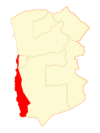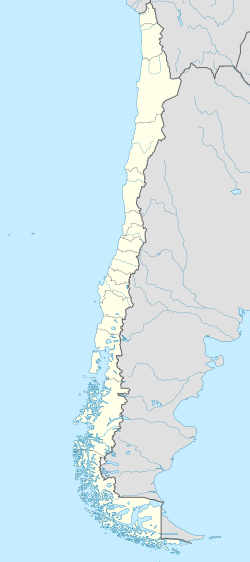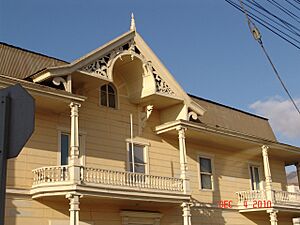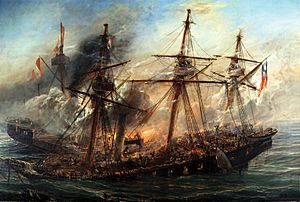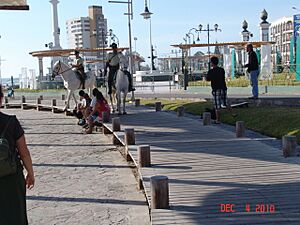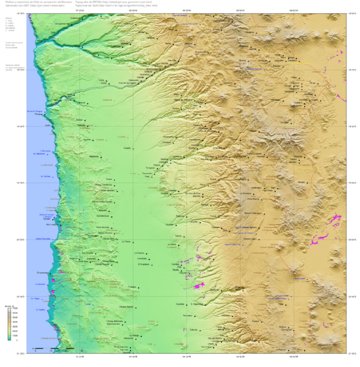Iquique facts for kids
Quick facts for kids
Iquique
|
||||||
|---|---|---|---|---|---|---|
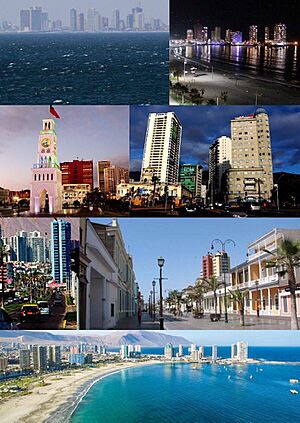
Montage of images of Iquique.
|
||||||
|
||||||
| Country | ||||||
| Region | ||||||
| Province | Iquique | |||||
| Founded | 16th Century | |||||
| Government | ||||||
| • Type | Municipal council | |||||
| Area | ||||||
| • Total | 2,242.1 km2 (865.7 sq mi) | |||||
| Elevation | 1 m (3 ft) | |||||
| Population
(2017 Census)
|
||||||
| • Total | 191,468 | |||||
| • Density | 85.3967/km2 (221.177/sq mi) | |||||
| Time zone | UTC−4 (CLT) | |||||
| • Summer (DST) | UTC−3 (CLST) | |||||
| Postal code |
1100000
|
|||||
| Climate | BWh | |||||
| Website | Official website: http://www.municipioiquique.cl/ | |||||
Iquique (pronounced ee-KEE-kay) is a lively port city in northern Chile. It's the capital of the Iquique Province and the Tarapacá Region. You can find Iquique right on the Pacific coast, next to the Atacama Desert.
This city is home to about 191,468 people (as of 2017). Iquique grew a lot in the 1800s because of saltpetre mining in the desert. It used to be a city in Peru but became part of Chile after the War of the Pacific (1879–1883). Today, Iquique is special because it's one of only two free ports in Chile. This means goods can be imported and exported without paying extra taxes, making it a great place for trade!
Contents
Discovering Iquique's Past
Iquique was founded in the 1500s, but people called the Chango lived here as early as 7,000 BC. For a long time, Iquique was part of Peru. The city grew because of rich mineral deposits like sodium nitrate (saltpetre) and guano (bird droppings used as fertilizer) found in the nearby Atacama Desert.
In 1835, the famous scientist Charles Darwin visited Iquique during his voyage on the Beagle. He noted that the town needed basic things like water and firewood, which had to be brought from far away. He also saw the saltpetre factories.
Earthquakes and Resilience
Iquique has faced many strong earthquakes over the years. Some major ones include:
- The 1868 Arica earthquake
- The 1877 Iquique earthquake
- The 2005 Tarapacá earthquake
- The 2014 Iquique earthquake, which was a very strong 8.2 magnitude quake.
Despite these challenges, the city has always rebuilt and recovered.
The War of the Pacific and Its Impact
In 1879, a conflict known as the War of the Pacific began between Bolivia, Peru, and Chile. A famous naval battle, the Battle of Iquique, took place in Iquique's harbor on May 21, 1879. This day is now celebrated as Navy Day, a national holiday in Chile. After the war, Iquique and the surrounding area became part of Chile.
Many people from other parts of Chile moved to this area, known as the Norte Grande (Great North). The export of Chilean saltpetre, especially to European countries, helped the city grow even more. This attracted people from other countries and led to a rapid expansion of homes and businesses.
A Sad Event in History
In December 1907, a very sad event happened in Iquique. Thousands of saltpetre miners, along with their families, came to the city to protest their difficult working conditions and low wages. They gathered inside the Santa María School. Sadly, the Chilean Army opened fire on them. This event is known as the Santa María de Iquique Massacre. It was a terrible tragedy, and many people lost their lives. The folk music group Quilapayún later created an album, Cantata Santa María de Iquique, to remember this event.
How Iquique is Governed
Iquique is managed by a municipal council, which is like a local government. The head of this council is called an alcalde (mayor), who is chosen by the people every four years. The current mayor is Mauricio Soria Macchiavello.
Iquique is also part of larger political areas in Chile. Its people are represented in the Chamber of Deputies and the Senate, which are parts of Chile's national government.
Iquique's Economy and Trade
Iquique is very important for trade in South America. It has one of the largest duty-free commercial port centers, called the Zona Franca of Iquique (Free Zone of Iquique), or Zofri. This area has many warehouses, banks, and restaurants, covering about 2.4 square kilometers (almost 1 square mile). It's a busy place for buying and selling goods without extra taxes.
Mining is also a big part of Iquique's economy, especially copper mining. Large copper mines like Quebrada Blanca, Cerro Colorado, and Doña Inés de Collahuasí are important for the region.
People and Population
According to the 2002 census, the area of Iquique had about 216,419 people. Most of them (99.2%) lived in the city, while a small number lived in rural areas. The population grew quite a bit between 1992 and 2002. Iquique is home to more than half of all the people in the Tarapacá region.
Iquique is a diverse city with many different ethnic groups. You'll find communities of people from:
- Croatia
- Italy
- Greece
- China
- Arabic countries
- Peruvians
- Bolivians
- British people (like Scots)
- French people
In the early 1900s, many East Indian workers came to Iquique to work in the saltpetre mines. Today, their descendants are part of the local population. More recently, some North Americans and Australians have moved to Iquique to retire and enjoy the city's sunny beach climate. About 9.2% of the total population are immigrants.
Here's how the population of Iquique has changed over time:
| Year | 1992 | 2002 |
|---|---|---|
| Population | 145,139 | 164,396 |
Iquique's Climate
Iquique has a very mild to warm desert climate. This means it's usually sunny and warm all year round, with very little rain. In fact, it's common for Iquique to have years with almost no rainfall at all, making it one of the driest cities in the world, similar to Arica. Even though it's a desert, Iquique often has cloudy skies because it's right on the coast.
Getting Around: Transport
Iquique is served by the Diego Aracena International Airport (IATA: IQQ, ICAO: SCDA). This airport is located about 48 kilometers (30 miles) south of the city, right on the Pacific coast. It connects Iquique to other parts of Chile and beyond.
Sports in Iquique
Iquique is home to a professional football (soccer) team called Deportes Iquique. The city also hosted the 2016 FIRS Women's Roller Hockey World Cup, showing its ability to host international sporting events.
Notable People from Iquique
Some famous people were born or lived in Iquique:
- Juan Zanelli (1906–1944) – A racing car driver.
- Arturo Godoy (1912–1986) – A professional boxer.
- Tomasa del Real (1986) – A modern music artist known for "Neoperreo" and "Reggaeton."
Images for kids
See also
 In Spanish: Iquique para niños
In Spanish: Iquique para niños
 | Audre Lorde |
 | John Berry Meachum |
 | Ferdinand Lee Barnett |




